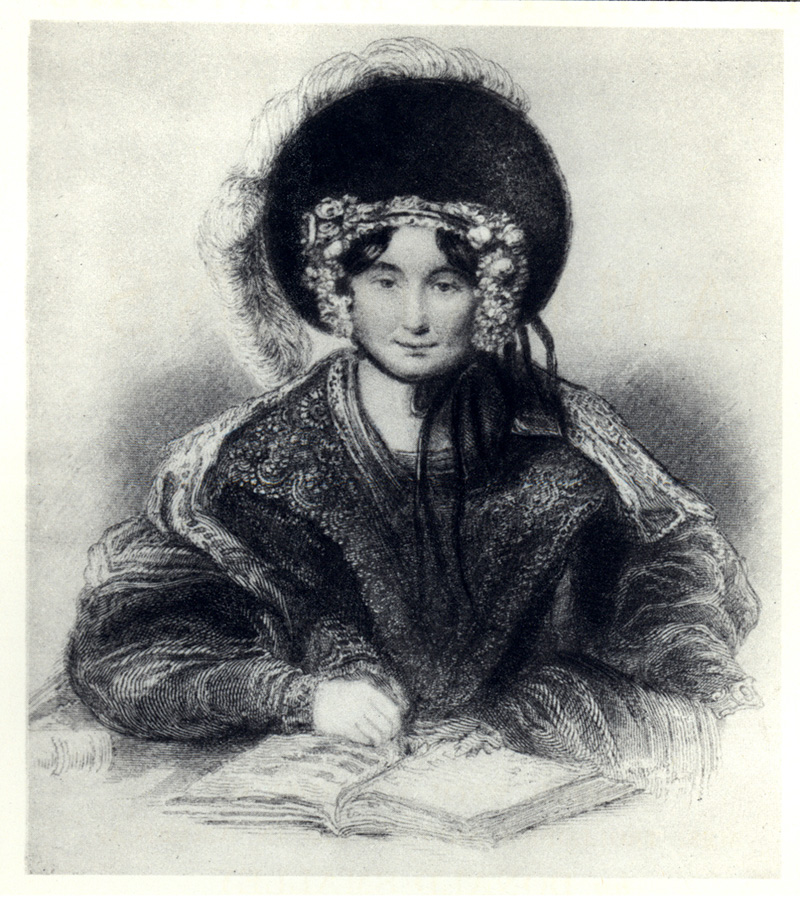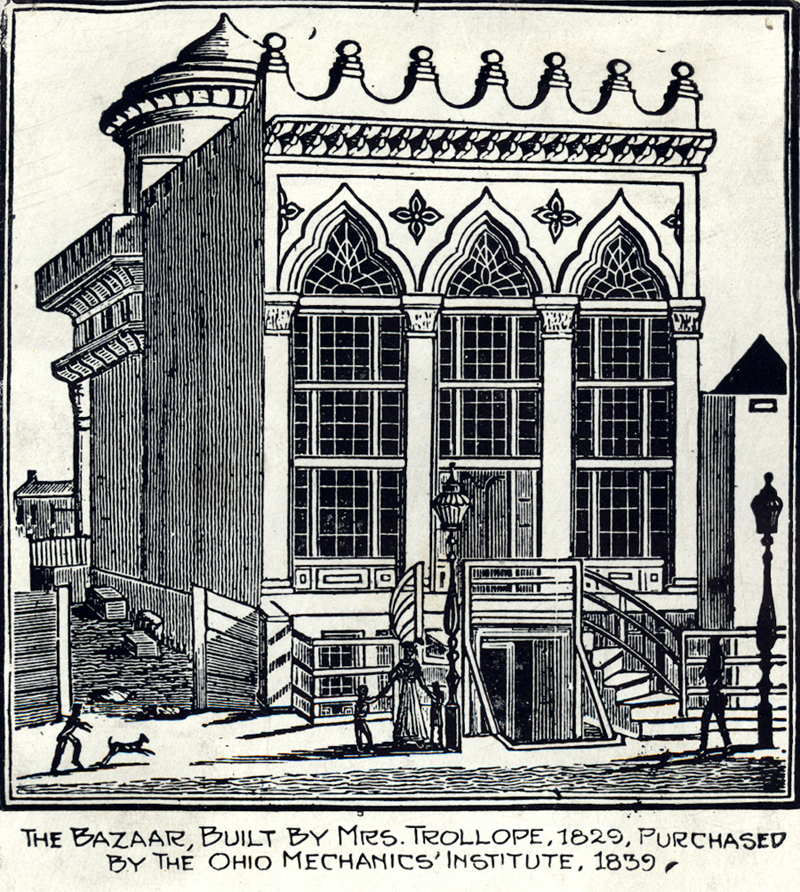By Janice Schulz
“We heard on every side, that of all the known places on ‘the globe called earth,’ Cincinnati was the most favourable for a young man to settle in…”
From Domestic Manners of the Americans
___________________________________
London gentlewoman Mrs. Frances Trollope had an idea. She would open a shop – a shop in America where she could offer the residents of that fast-growing country the finer things in life – unique items that they otherwise would not have the chance to purchase. Her middle son Henry could run the store, establish himself in a lucrative business, and take advantage of the opportunities that America had to offer a young man. Although possessed of the highest manners and an impressive family background, the Trollopes were not wealthy by the definition of London society, a fact that seriously interfered with Mrs. Trollope’s plans, especially for her children’s future. So she looked to America, and specifically to Cincinnati, to provide the right economic climate and market for her shop idea. In the end the venture was not a smashing success and her expectations of Cincinnati were far from confirmed, but the trip resulted in what would become Mrs. Trollope’s crowning glory, Domestic Manners of the Americans, a travel log of her adventures in the United States. While the book earned Mrs. Trollope popularity and was hailed as a triumph in her homeland, its revelations of uncultured Americans served to portray her as a snobbish villain in the States, particularly with the residents of Cincinnati.
Mrs. Trollope and three of her five children set off on their journey from London to America on November 4, 1827, arriving at the port of New Orleans on Christmas Day, 1827, and in Cincinnati by February of 1828. Mrs. Trollope found Cincinnatians extremely industrious, neither idle nor lazy, but she also felt that by spending so much time on work and economic pursuits they allowed no room for the finer things in life, such as art, dancing, and literature, resulting in a very dull and uncivilized populace. Cincinnati’s abundant pig population and the citizen’s preoccupation with the animals did nothing to endear the city to Mrs. Trollope, who encountered live pigs on the street and upon walking along the creeks and meadows met with a scandalous amount of pig parts and blood discarded by slaughterhouses. Although Cincinnati’s markets did impress her, she was appalled by the site of people “devouring” watermelons in public, a common scene complete with shooting seeds and juices dripping from indulgers’ mouths.
Mrs. Trollope’s idea of creating a finer-things shop took shape and grew to include a coffee house, saloon, ballroom, and exhibition gallery. Her husband Thomas, who along with their eldest son, another Thomas, arrived at Cincinnati in November 1828, was tasked with procuring items from England to be sold in the store. Construction began in 1829 on a four-story Bazaar building situated on the south side of Third Street east of Broadway, but economic difficulties forced the Trollopes to abandon the project before it was completed. When the family left Cincinnati in March, 1829, Mrs. Trollope felt that “there was not one of our party who did not experience a sensation of pleasure in leaving it,” regretting only that “we had ever entered it; for we had wasted health, time, and money there.” After visiting Wheeling, Baltimore, Washington DC, Philadelphia, and New York, they finally left the states in the summer of 1831. Domestic Manners of the Americans was published in March of 1832. Mrs. Trollope published more books in her lifetime and her eldest son Thomas wrote several travel books as well, but her youngest son Anthony would emerge as the literary master of the family with his prolific collection of Victorian novels, short stories, and travel books.
By all accounts the Bazaar was an eclectic mix of period and regional architecture, regularly described as “grotesque,” “absurd” or more kindly as “a curiosity.” The combination of the building’s appearance, the business failure, and no doubt Mrs. Trollope’s derisive portrayal of Cincinnati and its inhabitants, earned the Bazaar the nickname “Trollope’s Folly.” The Ohio Mechanics Institute purchased the Bazaar in 1838. After subsequent use as the Botanico Medical School and other reincarnations, the building was torn down in 1881 to make way for an apartment complex. Today Interstate 71 runs over the spot where the Bazaar once stood. A partial view of the Bazaar building can be seen in the 1848 Cincinnati Panoramic Daguerreotype at the Public Library of Cincinnati and Hamilton County.
The Archives & Rare Books Library holds two copies of Domestic Manners of the Americans, an 1832 edition printed in London, intended for sale in America (E165 .T84 1832), and a 1949 edition printed in New York ( E165 .T84 1949). Editorial introductions in the two volumes attest to the initial ire felt by Americans against Mrs. Trollope’s missive as well as the long-term value that the tome has earned as a descriptive source of early Cincinnati and American life. Both books include illustrations originally displayed in the first edition. Editor Donald Smalley’s discovery and purchase (via Indiana University) of Mrs. Trollope’s American travel notebooks allowed him to paint a much broader picture of Trollope’s trip in his introduction to the 1949 New York edition.
___________________________________
Other Trollope books in the Archives & Rare Books Library
By Thomas Adolphus Trollope
A Summer in Brittany DC611.B848 T7 1840 (in two volumes, edited by Frances Trollope)
By Anthony Trollope:
Barchester Towers PR5684 .B34 1958
Four Lectures PR5681 .P3 1938
London tradesmen PR5684 .L6 1927
South Africa DT753 .T84 1878 (in two volumes)
Lady Anna PR5684 .L25 1874
Ralph the Heir PR5684 .R3 1871
“The Claverings” in The Galaxy. A Magazine of Entertaining Reading, vols. 1-3 1866-1867 AP2 .G22
By others, featuring Mrs. Trollope:
The Lady from Keppel Street by Clyde Park PR5699 .T3 Z8 1958
The Americans. By an American in London by Calvin Colton E165 .C72
Centennial History of Cincinnati by Charles Greve F499.C5 G74 (vol. 1)


